ACC80019: Financial Accounting Theory - Conceptual Framework Essay
VerifiedAdded on 2022/09/17
|13
|3504
|30
Essay
AI Summary
This assignment is a research essay focusing on financial accounting theory, specifically the IASB's conceptual framework. The essay delves into the history of its development, the influence on standard-setting processes, and the legitimacy of the standard-setting boards. It examines the arguments of Hines regarding the strategic maneuvering of conceptual frameworks to provide legitimacy, especially during periods of competition or government intervention. The essay also explores the IASB's reasons for developing the conceptual framework, including its role in providing guidance to financial report users and preparers, promoting consistent accounting practices, and assisting in the development of accounting policies where specific IFRS standards are absent. The paper also discusses the due processes involved in setting accounting standards, the impact of political pressures, and the importance of the conceptual framework in fulfilling recognition criteria for financial statement elements. The assignment provides a comprehensive overview of the conceptual framework's role and influence in financial accounting.
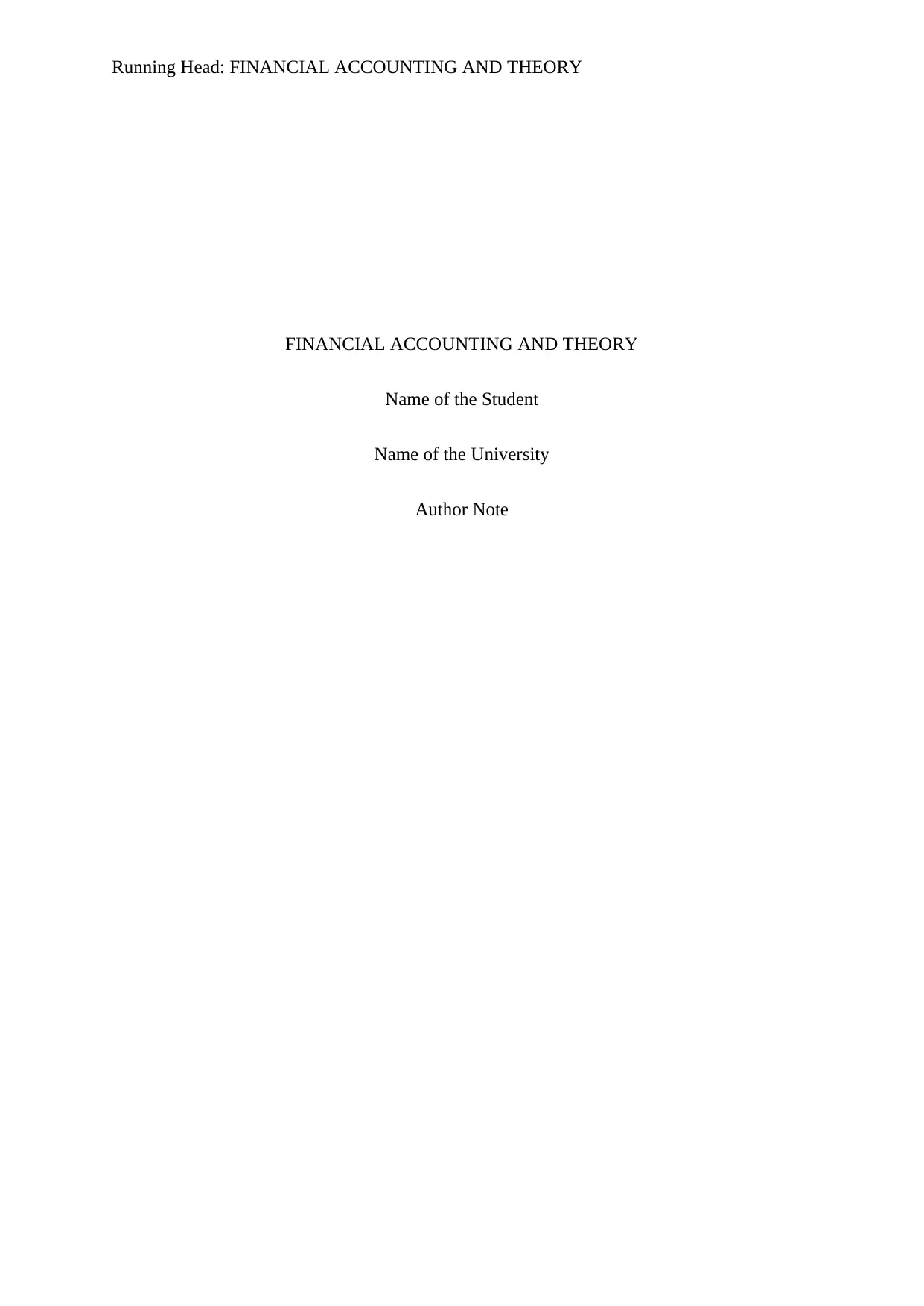
Running Head: FINANCIAL ACCOUNTING AND THEORY
FINANCIAL ACCOUNTING AND THEORY
Name of the Student
Name of the University
Author Note
FINANCIAL ACCOUNTING AND THEORY
Name of the Student
Name of the University
Author Note
Paraphrase This Document
Need a fresh take? Get an instant paraphrase of this document with our AI Paraphraser
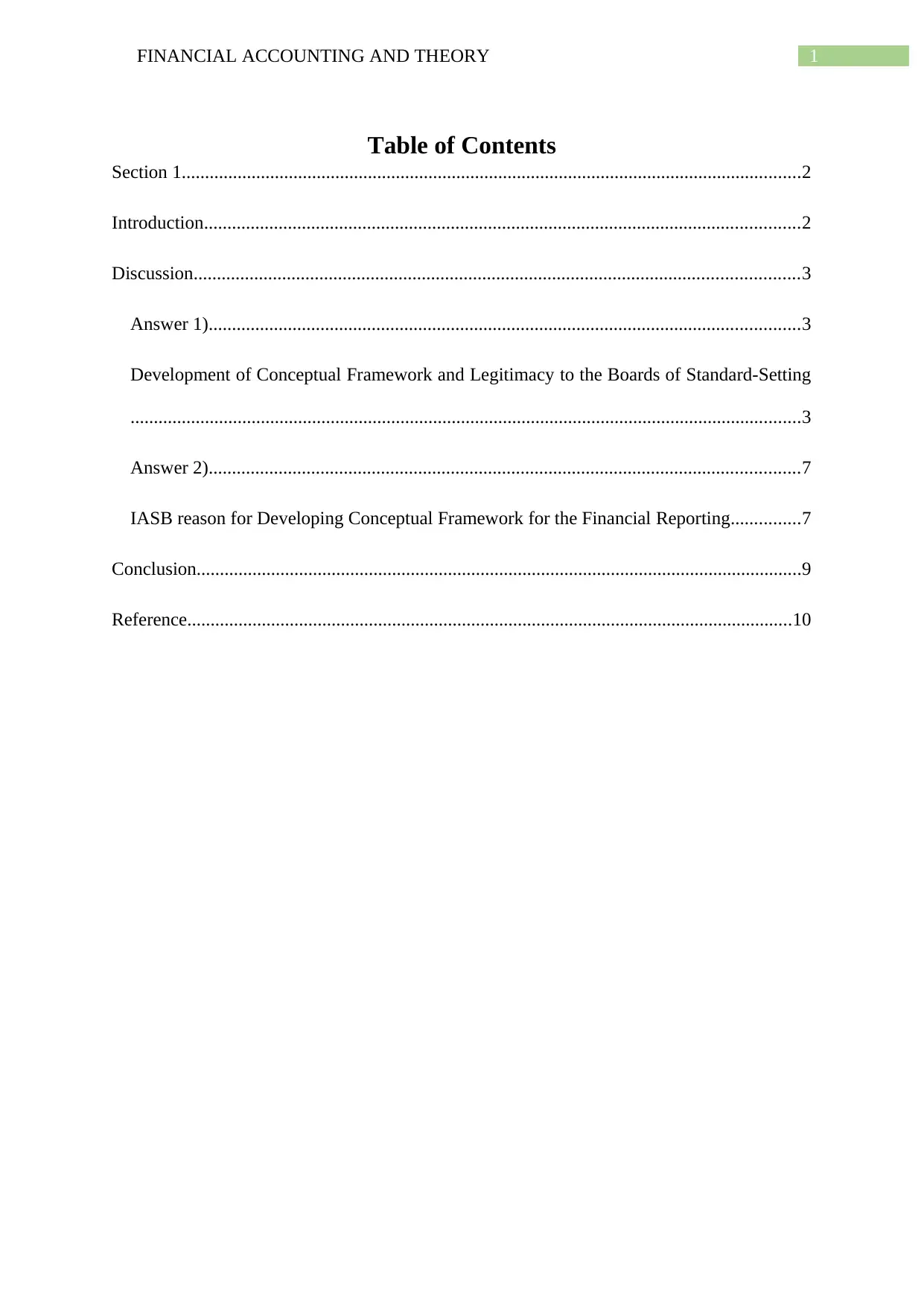
1FINANCIAL ACCOUNTING AND THEORY
Table of Contents
Section 1.....................................................................................................................................2
Introduction................................................................................................................................2
Discussion..................................................................................................................................3
Answer 1)...............................................................................................................................3
Development of Conceptual Framework and Legitimacy to the Boards of Standard-Setting
................................................................................................................................................3
Answer 2)...............................................................................................................................7
IASB reason for Developing Conceptual Framework for the Financial Reporting...............7
Conclusion..................................................................................................................................9
Reference..................................................................................................................................10
Table of Contents
Section 1.....................................................................................................................................2
Introduction................................................................................................................................2
Discussion..................................................................................................................................3
Answer 1)...............................................................................................................................3
Development of Conceptual Framework and Legitimacy to the Boards of Standard-Setting
................................................................................................................................................3
Answer 2)...............................................................................................................................7
IASB reason for Developing Conceptual Framework for the Financial Reporting...............7
Conclusion..................................................................................................................................9
Reference..................................................................................................................................10
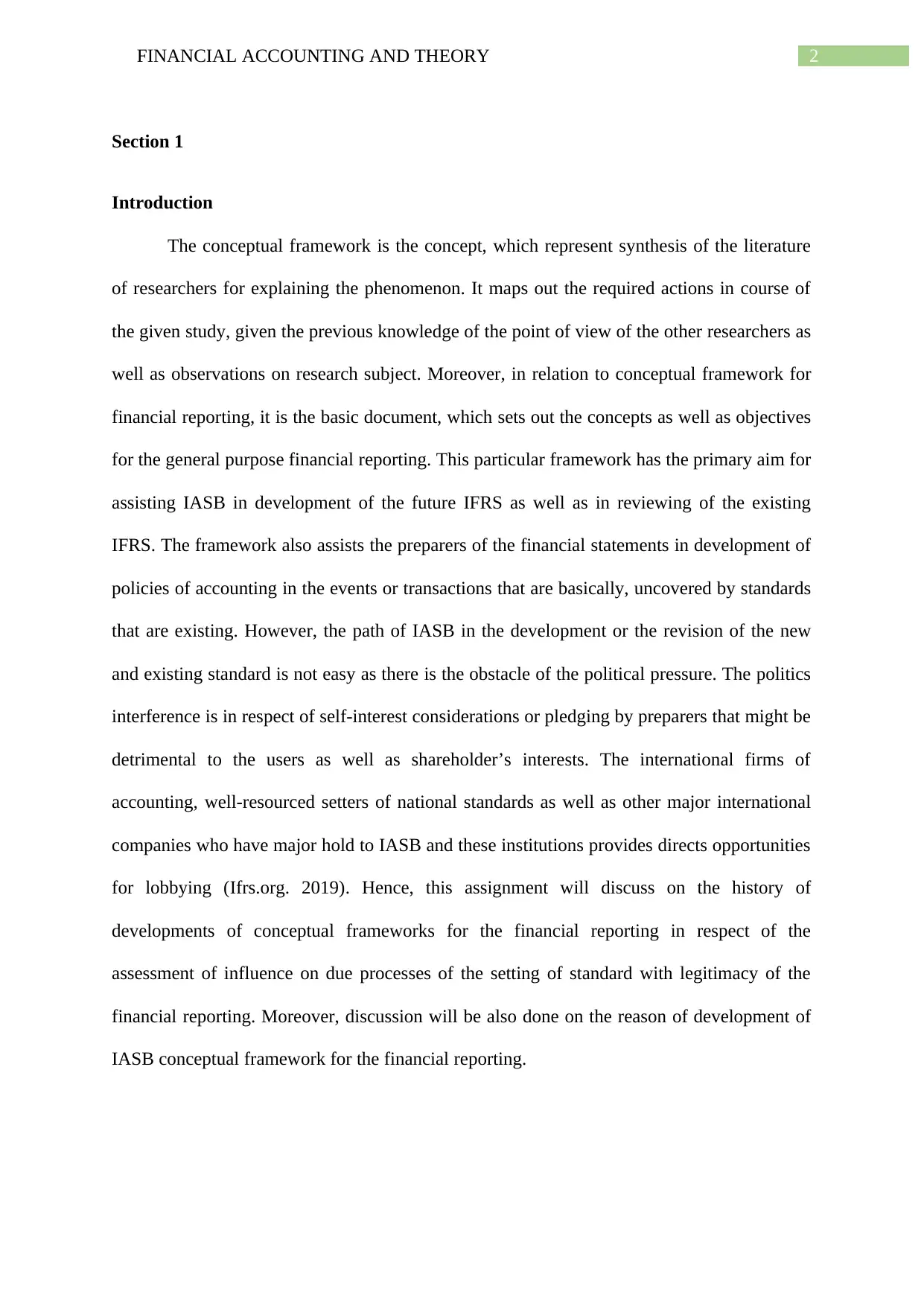
2FINANCIAL ACCOUNTING AND THEORY
Section 1
Introduction
The conceptual framework is the concept, which represent synthesis of the literature
of researchers for explaining the phenomenon. It maps out the required actions in course of
the given study, given the previous knowledge of the point of view of the other researchers as
well as observations on research subject. Moreover, in relation to conceptual framework for
financial reporting, it is the basic document, which sets out the concepts as well as objectives
for the general purpose financial reporting. This particular framework has the primary aim for
assisting IASB in development of the future IFRS as well as in reviewing of the existing
IFRS. The framework also assists the preparers of the financial statements in development of
policies of accounting in the events or transactions that are basically, uncovered by standards
that are existing. However, the path of IASB in the development or the revision of the new
and existing standard is not easy as there is the obstacle of the political pressure. The politics
interference is in respect of self-interest considerations or pledging by preparers that might be
detrimental to the users as well as shareholder’s interests. The international firms of
accounting, well-resourced setters of national standards as well as other major international
companies who have major hold to IASB and these institutions provides directs opportunities
for lobbying (Ifrs.org. 2019). Hence, this assignment will discuss on the history of
developments of conceptual frameworks for the financial reporting in respect of the
assessment of influence on due processes of the setting of standard with legitimacy of the
financial reporting. Moreover, discussion will be also done on the reason of development of
IASB conceptual framework for the financial reporting.
Section 1
Introduction
The conceptual framework is the concept, which represent synthesis of the literature
of researchers for explaining the phenomenon. It maps out the required actions in course of
the given study, given the previous knowledge of the point of view of the other researchers as
well as observations on research subject. Moreover, in relation to conceptual framework for
financial reporting, it is the basic document, which sets out the concepts as well as objectives
for the general purpose financial reporting. This particular framework has the primary aim for
assisting IASB in development of the future IFRS as well as in reviewing of the existing
IFRS. The framework also assists the preparers of the financial statements in development of
policies of accounting in the events or transactions that are basically, uncovered by standards
that are existing. However, the path of IASB in the development or the revision of the new
and existing standard is not easy as there is the obstacle of the political pressure. The politics
interference is in respect of self-interest considerations or pledging by preparers that might be
detrimental to the users as well as shareholder’s interests. The international firms of
accounting, well-resourced setters of national standards as well as other major international
companies who have major hold to IASB and these institutions provides directs opportunities
for lobbying (Ifrs.org. 2019). Hence, this assignment will discuss on the history of
developments of conceptual frameworks for the financial reporting in respect of the
assessment of influence on due processes of the setting of standard with legitimacy of the
financial reporting. Moreover, discussion will be also done on the reason of development of
IASB conceptual framework for the financial reporting.
⊘ This is a preview!⊘
Do you want full access?
Subscribe today to unlock all pages.

Trusted by 1+ million students worldwide
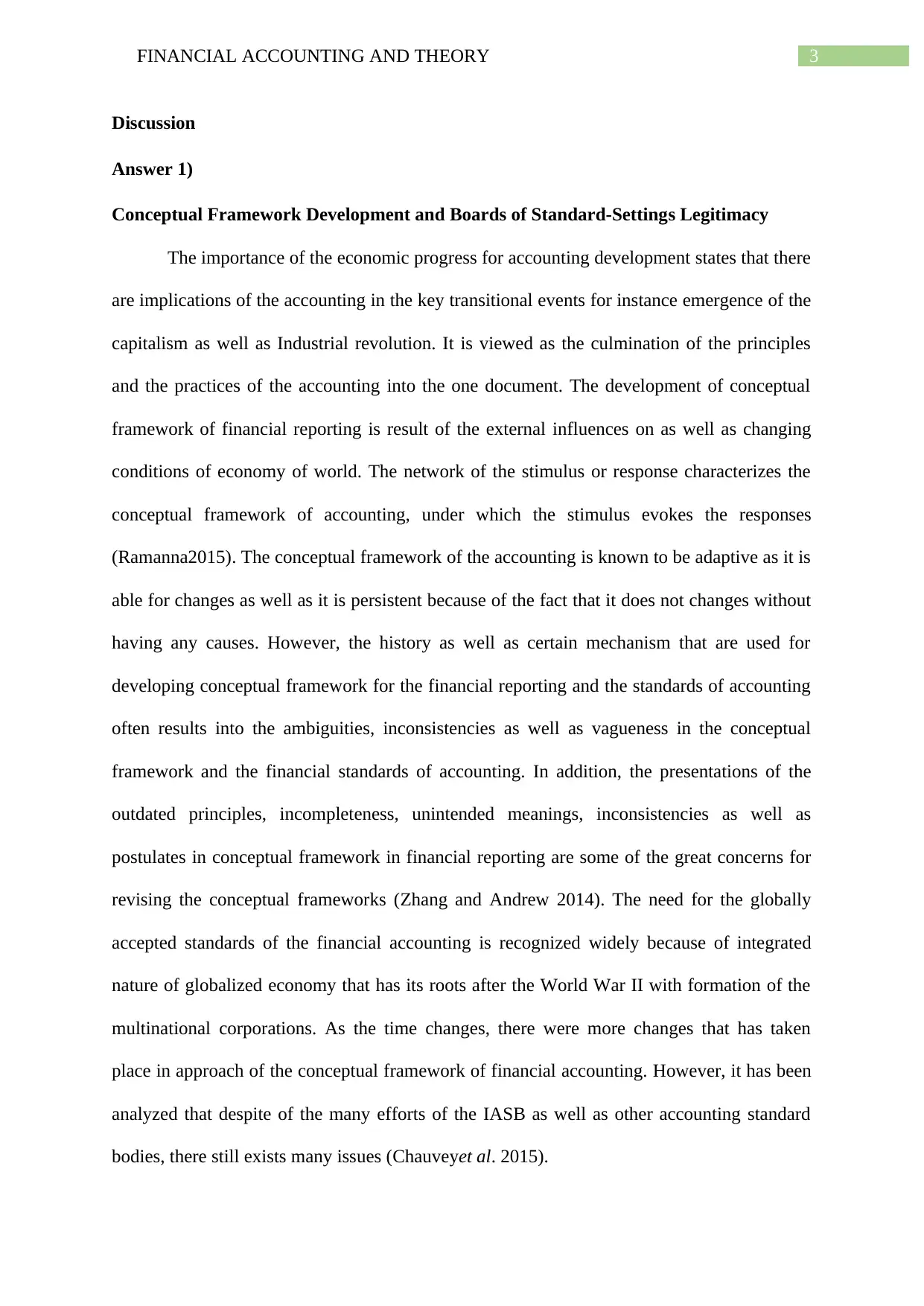
3FINANCIAL ACCOUNTING AND THEORY
Discussion
Answer 1)
Conceptual Framework Development and Boards of Standard-Settings Legitimacy
The importance of the economic progress for accounting development states that there
are implications of the accounting in the key transitional events for instance emergence of the
capitalism as well as Industrial revolution. It is viewed as the culmination of the principles
and the practices of the accounting into the one document. The development of conceptual
framework of financial reporting is result of the external influences on as well as changing
conditions of economy of world. The network of the stimulus or response characterizes the
conceptual framework of accounting, under which the stimulus evokes the responses
(Ramanna2015). The conceptual framework of the accounting is known to be adaptive as it is
able for changes as well as it is persistent because of the fact that it does not changes without
having any causes. However, the history as well as certain mechanism that are used for
developing conceptual framework for the financial reporting and the standards of accounting
often results into the ambiguities, inconsistencies as well as vagueness in the conceptual
framework and the financial standards of accounting. In addition, the presentations of the
outdated principles, incompleteness, unintended meanings, inconsistencies as well as
postulates in conceptual framework in financial reporting are some of the great concerns for
revising the conceptual frameworks (Zhang and Andrew 2014). The need for the globally
accepted standards of the financial accounting is recognized widely because of integrated
nature of globalized economy that has its roots after the World War II with formation of the
multinational corporations. As the time changes, there were more changes that has taken
place in approach of the conceptual framework of financial accounting. However, it has been
analyzed that despite of the many efforts of the IASB as well as other accounting standard
bodies, there still exists many issues (Chauveyet al. 2015).
Discussion
Answer 1)
Conceptual Framework Development and Boards of Standard-Settings Legitimacy
The importance of the economic progress for accounting development states that there
are implications of the accounting in the key transitional events for instance emergence of the
capitalism as well as Industrial revolution. It is viewed as the culmination of the principles
and the practices of the accounting into the one document. The development of conceptual
framework of financial reporting is result of the external influences on as well as changing
conditions of economy of world. The network of the stimulus or response characterizes the
conceptual framework of accounting, under which the stimulus evokes the responses
(Ramanna2015). The conceptual framework of the accounting is known to be adaptive as it is
able for changes as well as it is persistent because of the fact that it does not changes without
having any causes. However, the history as well as certain mechanism that are used for
developing conceptual framework for the financial reporting and the standards of accounting
often results into the ambiguities, inconsistencies as well as vagueness in the conceptual
framework and the financial standards of accounting. In addition, the presentations of the
outdated principles, incompleteness, unintended meanings, inconsistencies as well as
postulates in conceptual framework in financial reporting are some of the great concerns for
revising the conceptual frameworks (Zhang and Andrew 2014). The need for the globally
accepted standards of the financial accounting is recognized widely because of integrated
nature of globalized economy that has its roots after the World War II with formation of the
multinational corporations. As the time changes, there were more changes that has taken
place in approach of the conceptual framework of financial accounting. However, it has been
analyzed that despite of the many efforts of the IASB as well as other accounting standard
bodies, there still exists many issues (Chauveyet al. 2015).
Paraphrase This Document
Need a fresh take? Get an instant paraphrase of this document with our AI Paraphraser
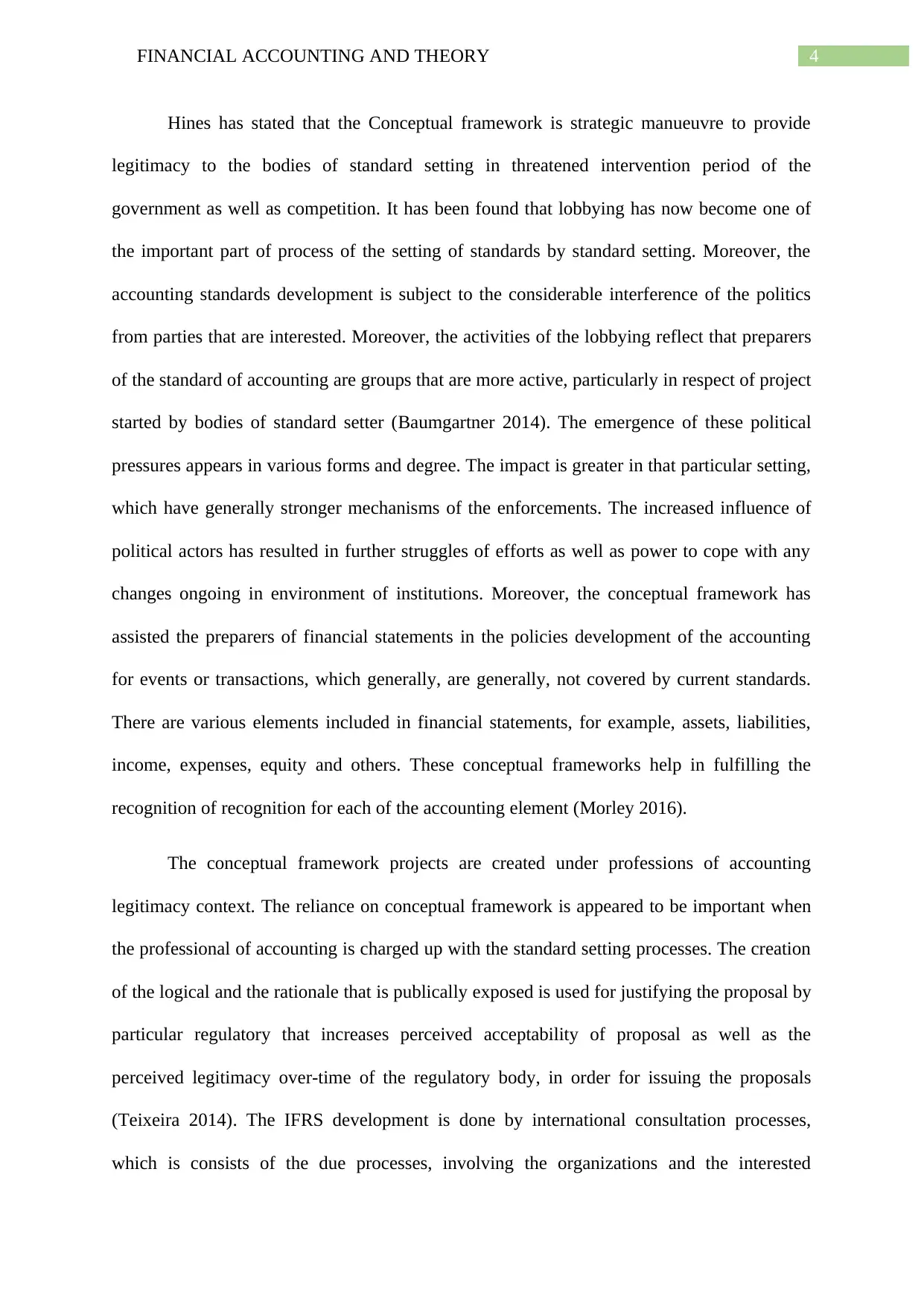
4FINANCIAL ACCOUNTING AND THEORY
Hines has stated that the Conceptual framework is strategic manueuvre to provide
legitimacy to the bodies of standard setting in threatened intervention period of the
government as well as competition. It has been found that lobbying has now become one of
the important part of process of the setting of standards by standard setting. Moreover, the
accounting standards development is subject to the considerable interference of the politics
from parties that are interested. Moreover, the activities of the lobbying reflect that preparers
of the standard of accounting are groups that are more active, particularly in respect of project
started by bodies of standard setter (Baumgartner 2014). The emergence of these political
pressures appears in various forms and degree. The impact is greater in that particular setting,
which have generally stronger mechanisms of the enforcements. The increased influence of
political actors has resulted in further struggles of efforts as well as power to cope with any
changes ongoing in environment of institutions. Moreover, the conceptual framework has
assisted the preparers of financial statements in the policies development of the accounting
for events or transactions, which generally, are generally, not covered by current standards.
There are various elements included in financial statements, for example, assets, liabilities,
income, expenses, equity and others. These conceptual frameworks help in fulfilling the
recognition of recognition for each of the accounting element (Morley 2016).
The conceptual framework projects are created under professions of accounting
legitimacy context. The reliance on conceptual framework is appeared to be important when
the professional of accounting is charged up with the standard setting processes. The creation
of the logical and the rationale that is publically exposed is used for justifying the proposal by
particular regulatory that increases perceived acceptability of proposal as well as the
perceived legitimacy over-time of the regulatory body, in order for issuing the proposals
(Teixeira 2014). The IFRS development is done by international consultation processes,
which is consists of the due processes, involving the organizations and the interested
Hines has stated that the Conceptual framework is strategic manueuvre to provide
legitimacy to the bodies of standard setting in threatened intervention period of the
government as well as competition. It has been found that lobbying has now become one of
the important part of process of the setting of standards by standard setting. Moreover, the
accounting standards development is subject to the considerable interference of the politics
from parties that are interested. Moreover, the activities of the lobbying reflect that preparers
of the standard of accounting are groups that are more active, particularly in respect of project
started by bodies of standard setter (Baumgartner 2014). The emergence of these political
pressures appears in various forms and degree. The impact is greater in that particular setting,
which have generally stronger mechanisms of the enforcements. The increased influence of
political actors has resulted in further struggles of efforts as well as power to cope with any
changes ongoing in environment of institutions. Moreover, the conceptual framework has
assisted the preparers of financial statements in the policies development of the accounting
for events or transactions, which generally, are generally, not covered by current standards.
There are various elements included in financial statements, for example, assets, liabilities,
income, expenses, equity and others. These conceptual frameworks help in fulfilling the
recognition of recognition for each of the accounting element (Morley 2016).
The conceptual framework projects are created under professions of accounting
legitimacy context. The reliance on conceptual framework is appeared to be important when
the professional of accounting is charged up with the standard setting processes. The creation
of the logical and the rationale that is publically exposed is used for justifying the proposal by
particular regulatory that increases perceived acceptability of proposal as well as the
perceived legitimacy over-time of the regulatory body, in order for issuing the proposals
(Teixeira 2014). The IFRS development is done by international consultation processes,
which is consists of the due processes, involving the organizations and the interested
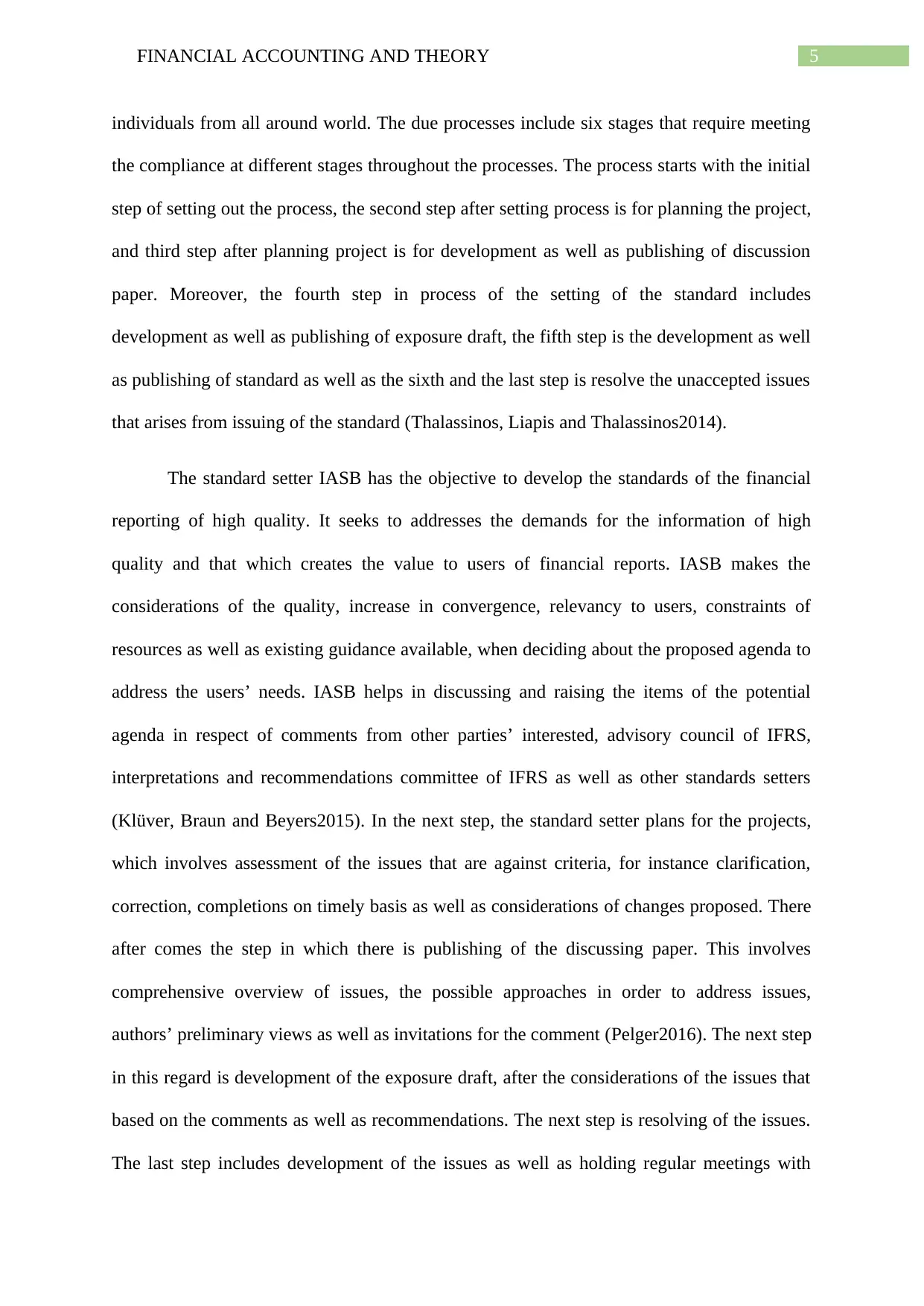
5FINANCIAL ACCOUNTING AND THEORY
individuals from all around world. The due processes include six stages that require meeting
the compliance at different stages throughout the processes. The process starts with the initial
step of setting out the process, the second step after setting process is for planning the project,
and third step after planning project is for development as well as publishing of discussion
paper. Moreover, the fourth step in process of the setting of the standard includes
development as well as publishing of exposure draft, the fifth step is the development as well
as publishing of standard as well as the sixth and the last step is resolve the unaccepted issues
that arises from issuing of the standard (Thalassinos, Liapis and Thalassinos2014).
The standard setter IASB has the objective to develop the standards of the financial
reporting of high quality. It seeks to addresses the demands for the information of high
quality and that which creates the value to users of financial reports. IASB makes the
considerations of the quality, increase in convergence, relevancy to users, constraints of
resources as well as existing guidance available, when deciding about the proposed agenda to
address the users’ needs. IASB helps in discussing and raising the items of the potential
agenda in respect of comments from other parties’ interested, advisory council of IFRS,
interpretations and recommendations committee of IFRS as well as other standards setters
(Klüver, Braun and Beyers2015). In the next step, the standard setter plans for the projects,
which involves assessment of the issues that are against criteria, for instance clarification,
correction, completions on timely basis as well as considerations of changes proposed. There
after comes the step in which there is publishing of the discussing paper. This involves
comprehensive overview of issues, the possible approaches in order to address issues,
authors’ preliminary views as well as invitations for the comment (Pelger2016). The next step
in this regard is development of the exposure draft, after the considerations of the issues that
based on the comments as well as recommendations. The next step is resolving of the issues.
The last step includes development of the issues as well as holding regular meetings with
individuals from all around world. The due processes include six stages that require meeting
the compliance at different stages throughout the processes. The process starts with the initial
step of setting out the process, the second step after setting process is for planning the project,
and third step after planning project is for development as well as publishing of discussion
paper. Moreover, the fourth step in process of the setting of the standard includes
development as well as publishing of exposure draft, the fifth step is the development as well
as publishing of standard as well as the sixth and the last step is resolve the unaccepted issues
that arises from issuing of the standard (Thalassinos, Liapis and Thalassinos2014).
The standard setter IASB has the objective to develop the standards of the financial
reporting of high quality. It seeks to addresses the demands for the information of high
quality and that which creates the value to users of financial reports. IASB makes the
considerations of the quality, increase in convergence, relevancy to users, constraints of
resources as well as existing guidance available, when deciding about the proposed agenda to
address the users’ needs. IASB helps in discussing and raising the items of the potential
agenda in respect of comments from other parties’ interested, advisory council of IFRS,
interpretations and recommendations committee of IFRS as well as other standards setters
(Klüver, Braun and Beyers2015). In the next step, the standard setter plans for the projects,
which involves assessment of the issues that are against criteria, for instance clarification,
correction, completions on timely basis as well as considerations of changes proposed. There
after comes the step in which there is publishing of the discussing paper. This involves
comprehensive overview of issues, the possible approaches in order to address issues,
authors’ preliminary views as well as invitations for the comment (Pelger2016). The next step
in this regard is development of the exposure draft, after the considerations of the issues that
based on the comments as well as recommendations. The next step is resolving of the issues.
The last step includes development of the issues as well as holding regular meetings with
⊘ This is a preview!⊘
Do you want full access?
Subscribe today to unlock all pages.

Trusted by 1+ million students worldwide
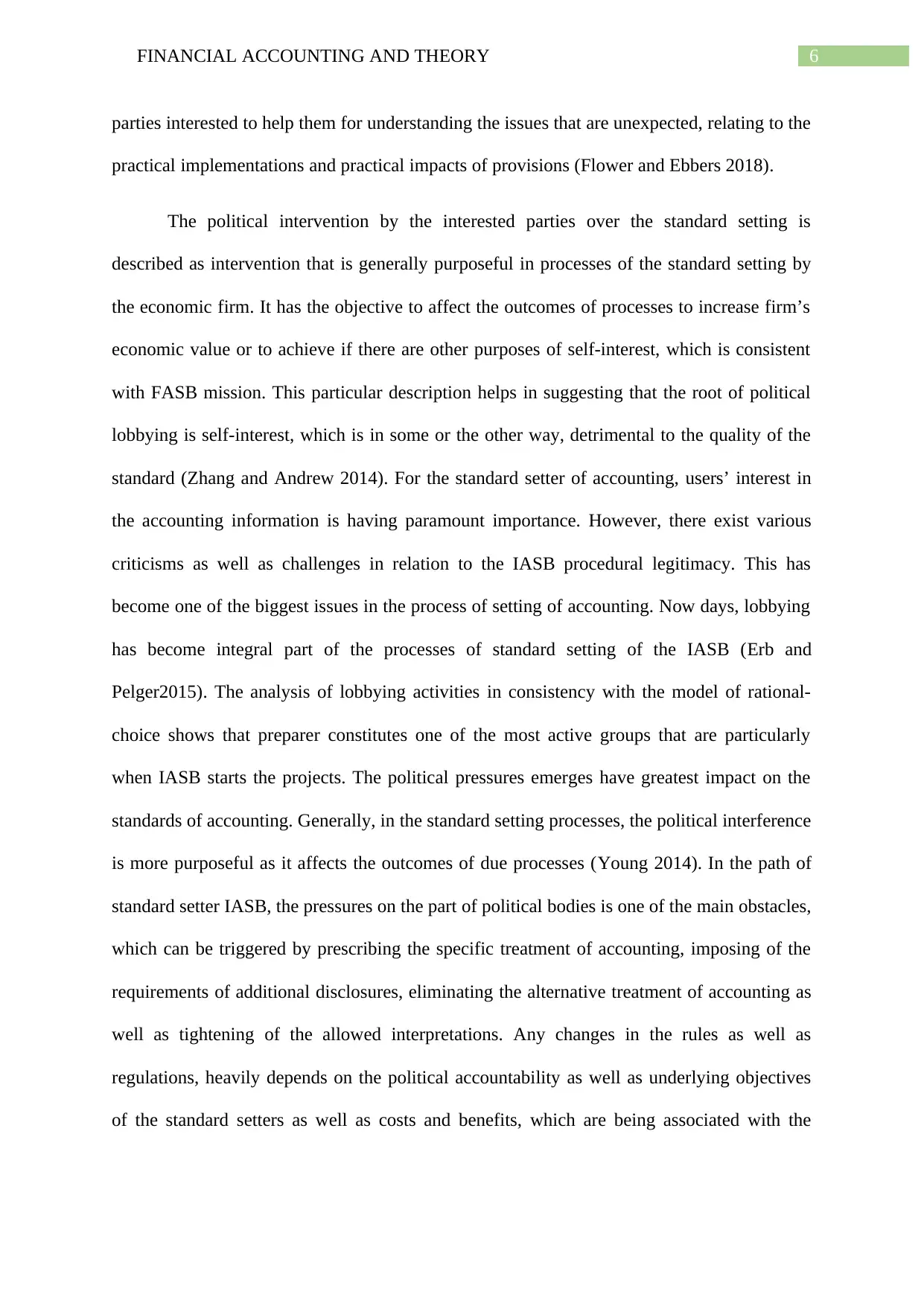
6FINANCIAL ACCOUNTING AND THEORY
parties interested to help them for understanding the issues that are unexpected, relating to the
practical implementations and practical impacts of provisions (Flower and Ebbers 2018).
The political intervention by the interested parties over the standard setting is
described as intervention that is generally purposeful in processes of the standard setting by
the economic firm. It has the objective to affect the outcomes of processes to increase firm’s
economic value or to achieve if there are other purposes of self-interest, which is consistent
with FASB mission. This particular description helps in suggesting that the root of political
lobbying is self-interest, which is in some or the other way, detrimental to the quality of the
standard (Zhang and Andrew 2014). For the standard setter of accounting, users’ interest in
the accounting information is having paramount importance. However, there exist various
criticisms as well as challenges in relation to the IASB procedural legitimacy. This has
become one of the biggest issues in the process of setting of accounting. Now days, lobbying
has become integral part of the processes of standard setting of the IASB (Erb and
Pelger2015). The analysis of lobbying activities in consistency with the model of rational-
choice shows that preparer constitutes one of the most active groups that are particularly
when IASB starts the projects. The political pressures emerges have greatest impact on the
standards of accounting. Generally, in the standard setting processes, the political interference
is more purposeful as it affects the outcomes of due processes (Young 2014). In the path of
standard setter IASB, the pressures on the part of political bodies is one of the main obstacles,
which can be triggered by prescribing the specific treatment of accounting, imposing of the
requirements of additional disclosures, eliminating the alternative treatment of accounting as
well as tightening of the allowed interpretations. Any changes in the rules as well as
regulations, heavily depends on the political accountability as well as underlying objectives
of the standard setters as well as costs and benefits, which are being associated with the
parties interested to help them for understanding the issues that are unexpected, relating to the
practical implementations and practical impacts of provisions (Flower and Ebbers 2018).
The political intervention by the interested parties over the standard setting is
described as intervention that is generally purposeful in processes of the standard setting by
the economic firm. It has the objective to affect the outcomes of processes to increase firm’s
economic value or to achieve if there are other purposes of self-interest, which is consistent
with FASB mission. This particular description helps in suggesting that the root of political
lobbying is self-interest, which is in some or the other way, detrimental to the quality of the
standard (Zhang and Andrew 2014). For the standard setter of accounting, users’ interest in
the accounting information is having paramount importance. However, there exist various
criticisms as well as challenges in relation to the IASB procedural legitimacy. This has
become one of the biggest issues in the process of setting of accounting. Now days, lobbying
has become integral part of the processes of standard setting of the IASB (Erb and
Pelger2015). The analysis of lobbying activities in consistency with the model of rational-
choice shows that preparer constitutes one of the most active groups that are particularly
when IASB starts the projects. The political pressures emerges have greatest impact on the
standards of accounting. Generally, in the standard setting processes, the political interference
is more purposeful as it affects the outcomes of due processes (Young 2014). In the path of
standard setter IASB, the pressures on the part of political bodies is one of the main obstacles,
which can be triggered by prescribing the specific treatment of accounting, imposing of the
requirements of additional disclosures, eliminating the alternative treatment of accounting as
well as tightening of the allowed interpretations. Any changes in the rules as well as
regulations, heavily depends on the political accountability as well as underlying objectives
of the standard setters as well as costs and benefits, which are being associated with the
Paraphrase This Document
Need a fresh take? Get an instant paraphrase of this document with our AI Paraphraser
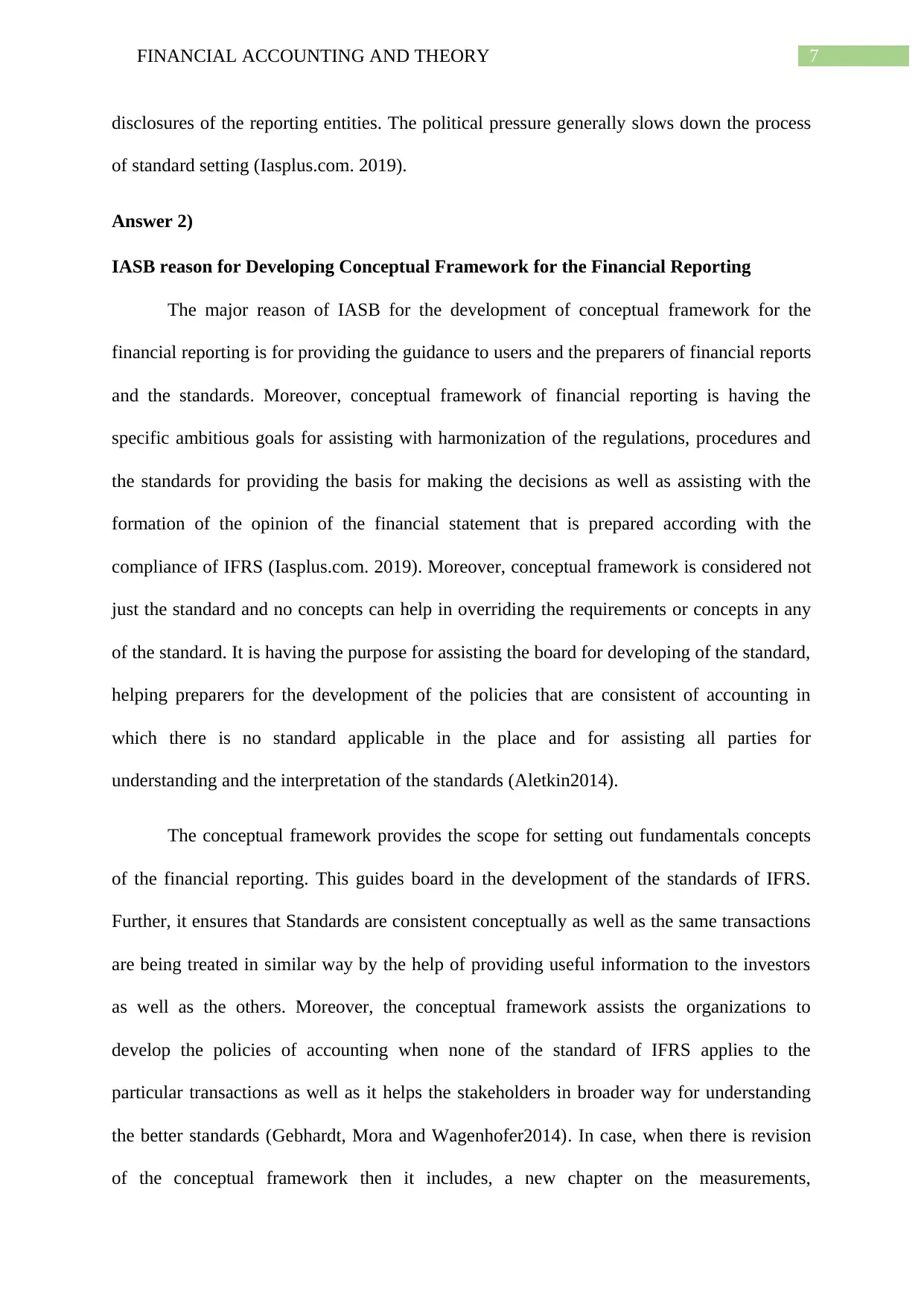
7FINANCIAL ACCOUNTING AND THEORY
disclosures of the reporting entities. The political pressure generally slows down the process
of standard setting (Iasplus.com. 2019).
Answer 2)
IASB reason for Developing Conceptual Framework for the Financial Reporting
The major reason of IASB for the development of conceptual framework for the
financial reporting is for providing the guidance to users and the preparers of financial reports
and the standards. Moreover, conceptual framework of financial reporting is having the
specific ambitious goals for assisting with harmonization of the regulations, procedures and
the standards for providing the basis for making the decisions as well as assisting with the
formation of the opinion of the financial statement that is prepared according with the
compliance of IFRS (Iasplus.com. 2019). Moreover, conceptual framework is considered not
just the standard and no concepts can help in overriding the requirements or concepts in any
of the standard. It is having the purpose for assisting the board for developing of the standard,
helping preparers for the development of the policies that are consistent of accounting in
which there is no standard applicable in the place and for assisting all parties for
understanding and the interpretation of the standards (Aletkin2014).
The conceptual framework provides the scope for setting out fundamentals concepts
of the financial reporting. This guides board in the development of the standards of IFRS.
Further, it ensures that Standards are consistent conceptually as well as the same transactions
are being treated in similar way by the help of providing useful information to the investors
as well as the others. Moreover, the conceptual framework assists the organizations to
develop the policies of accounting when none of the standard of IFRS applies to the
particular transactions as well as it helps the stakeholders in broader way for understanding
the better standards (Gebhardt, Mora and Wagenhofer2014). In case, when there is revision
of the conceptual framework then it includes, a new chapter on the measurements,
disclosures of the reporting entities. The political pressure generally slows down the process
of standard setting (Iasplus.com. 2019).
Answer 2)
IASB reason for Developing Conceptual Framework for the Financial Reporting
The major reason of IASB for the development of conceptual framework for the
financial reporting is for providing the guidance to users and the preparers of financial reports
and the standards. Moreover, conceptual framework of financial reporting is having the
specific ambitious goals for assisting with harmonization of the regulations, procedures and
the standards for providing the basis for making the decisions as well as assisting with the
formation of the opinion of the financial statement that is prepared according with the
compliance of IFRS (Iasplus.com. 2019). Moreover, conceptual framework is considered not
just the standard and no concepts can help in overriding the requirements or concepts in any
of the standard. It is having the purpose for assisting the board for developing of the standard,
helping preparers for the development of the policies that are consistent of accounting in
which there is no standard applicable in the place and for assisting all parties for
understanding and the interpretation of the standards (Aletkin2014).
The conceptual framework provides the scope for setting out fundamentals concepts
of the financial reporting. This guides board in the development of the standards of IFRS.
Further, it ensures that Standards are consistent conceptually as well as the same transactions
are being treated in similar way by the help of providing useful information to the investors
as well as the others. Moreover, the conceptual framework assists the organizations to
develop the policies of accounting when none of the standard of IFRS applies to the
particular transactions as well as it helps the stakeholders in broader way for understanding
the better standards (Gebhardt, Mora and Wagenhofer2014). In case, when there is revision
of the conceptual framework then it includes, a new chapter on the measurements,
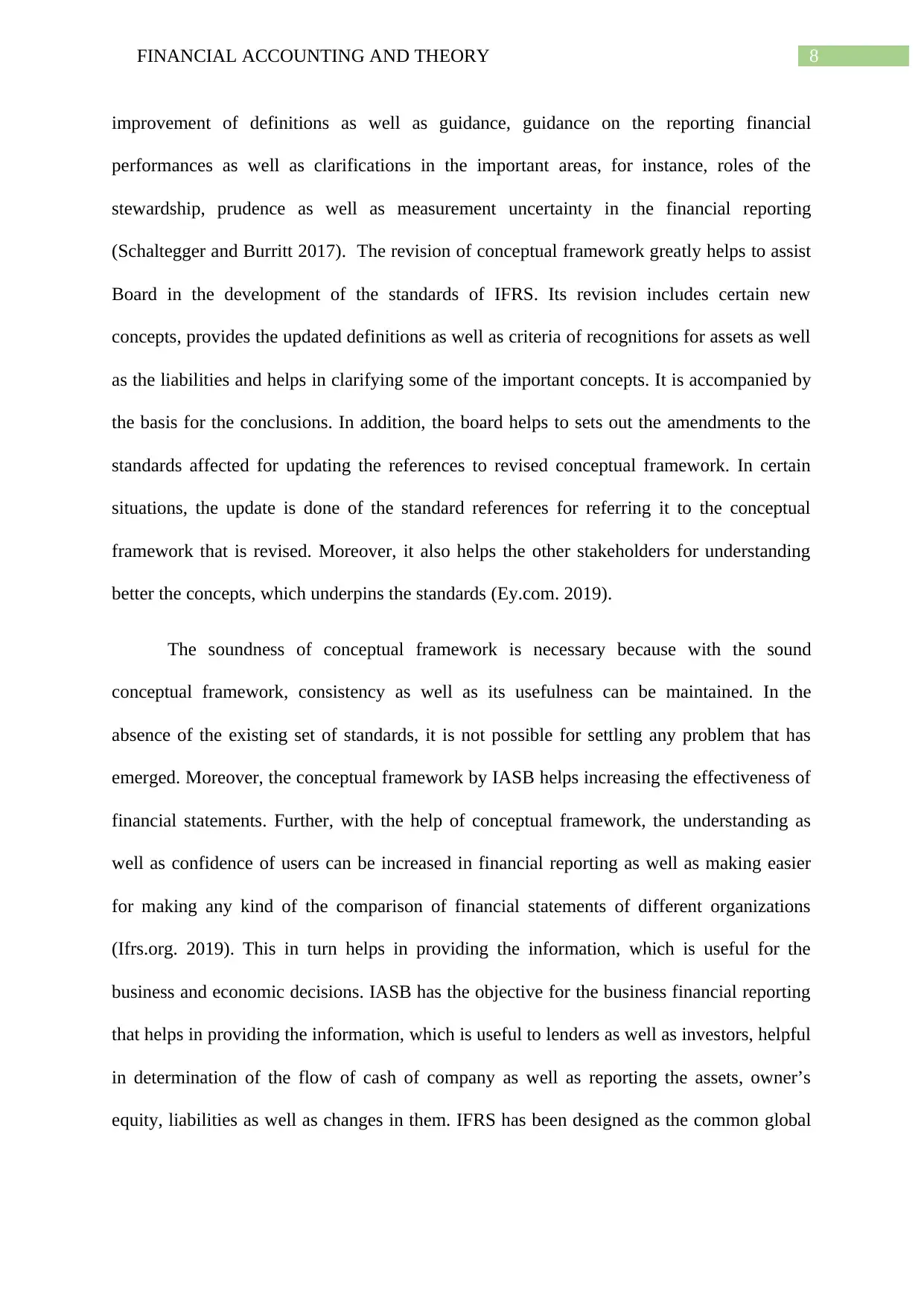
8FINANCIAL ACCOUNTING AND THEORY
improvement of definitions as well as guidance, guidance on the reporting financial
performances as well as clarifications in the important areas, for instance, roles of the
stewardship, prudence as well as measurement uncertainty in the financial reporting
(Schaltegger and Burritt 2017). The revision of conceptual framework greatly helps to assist
Board in the development of the standards of IFRS. Its revision includes certain new
concepts, provides the updated definitions as well as criteria of recognitions for assets as well
as the liabilities and helps in clarifying some of the important concepts. It is accompanied by
the basis for the conclusions. In addition, the board helps to sets out the amendments to the
standards affected for updating the references to revised conceptual framework. In certain
situations, the update is done of the standard references for referring it to the conceptual
framework that is revised. Moreover, it also helps the other stakeholders for understanding
better the concepts, which underpins the standards (Ey.com. 2019).
The soundness of conceptual framework is necessary because with the sound
conceptual framework, consistency as well as its usefulness can be maintained. In the
absence of the existing set of standards, it is not possible for settling any problem that has
emerged. Moreover, the conceptual framework by IASB helps increasing the effectiveness of
financial statements. Further, with the help of conceptual framework, the understanding as
well as confidence of users can be increased in financial reporting as well as making easier
for making any kind of the comparison of financial statements of different organizations
(Ifrs.org. 2019). This in turn helps in providing the information, which is useful for the
business and economic decisions. IASB has the objective for the business financial reporting
that helps in providing the information, which is useful to lenders as well as investors, helpful
in determination of the flow of cash of company as well as reporting the assets, owner’s
equity, liabilities as well as changes in them. IFRS has been designed as the common global
improvement of definitions as well as guidance, guidance on the reporting financial
performances as well as clarifications in the important areas, for instance, roles of the
stewardship, prudence as well as measurement uncertainty in the financial reporting
(Schaltegger and Burritt 2017). The revision of conceptual framework greatly helps to assist
Board in the development of the standards of IFRS. Its revision includes certain new
concepts, provides the updated definitions as well as criteria of recognitions for assets as well
as the liabilities and helps in clarifying some of the important concepts. It is accompanied by
the basis for the conclusions. In addition, the board helps to sets out the amendments to the
standards affected for updating the references to revised conceptual framework. In certain
situations, the update is done of the standard references for referring it to the conceptual
framework that is revised. Moreover, it also helps the other stakeholders for understanding
better the concepts, which underpins the standards (Ey.com. 2019).
The soundness of conceptual framework is necessary because with the sound
conceptual framework, consistency as well as its usefulness can be maintained. In the
absence of the existing set of standards, it is not possible for settling any problem that has
emerged. Moreover, the conceptual framework by IASB helps increasing the effectiveness of
financial statements. Further, with the help of conceptual framework, the understanding as
well as confidence of users can be increased in financial reporting as well as making easier
for making any kind of the comparison of financial statements of different organizations
(Ifrs.org. 2019). This in turn helps in providing the information, which is useful for the
business and economic decisions. IASB has the objective for the business financial reporting
that helps in providing the information, which is useful to lenders as well as investors, helpful
in determination of the flow of cash of company as well as reporting the assets, owner’s
equity, liabilities as well as changes in them. IFRS has been designed as the common global
⊘ This is a preview!⊘
Do you want full access?
Subscribe today to unlock all pages.

Trusted by 1+ million students worldwide
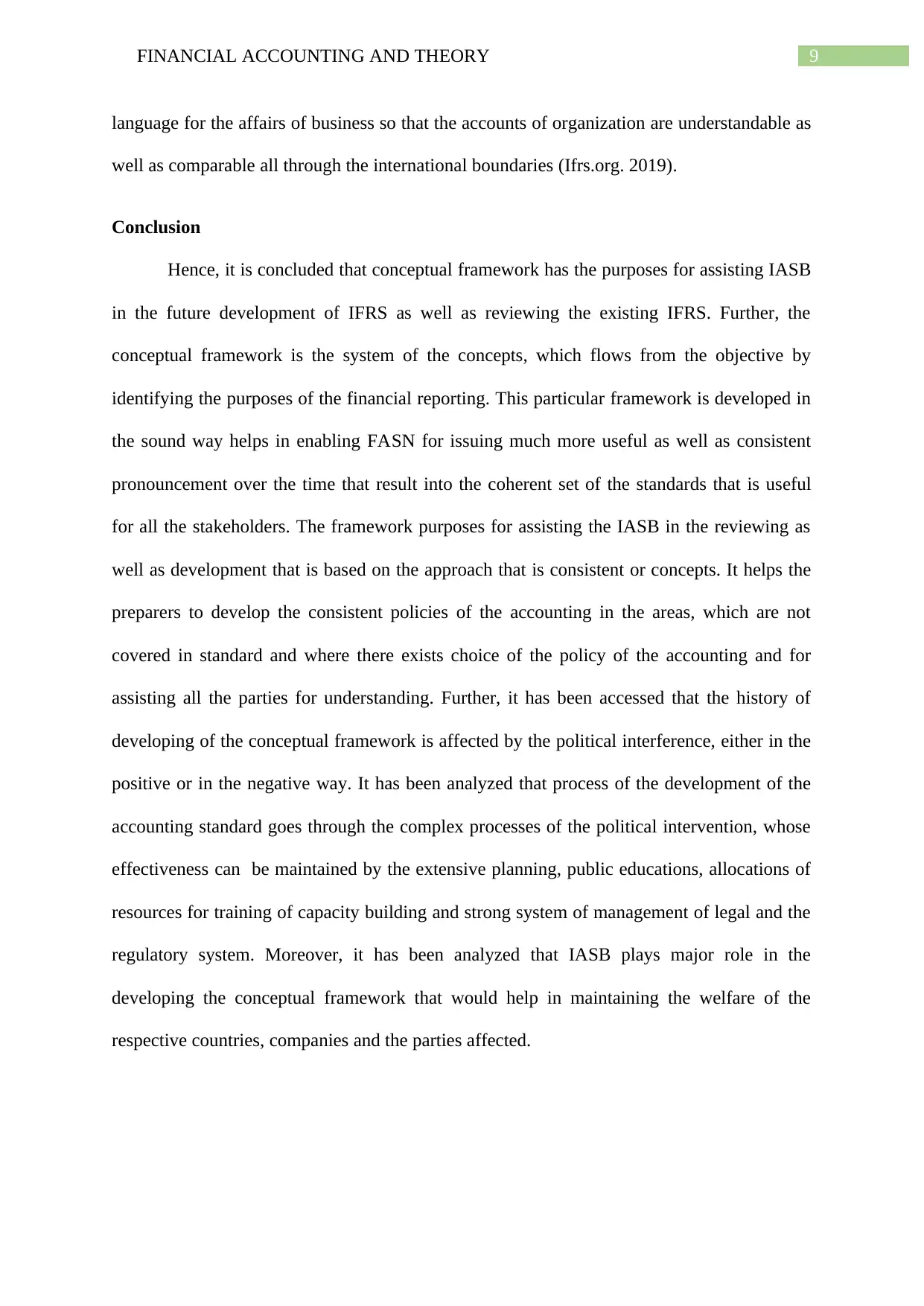
9FINANCIAL ACCOUNTING AND THEORY
language for the affairs of business so that the accounts of organization are understandable as
well as comparable all through the international boundaries (Ifrs.org. 2019).
Conclusion
Hence, it is concluded that conceptual framework has the purposes for assisting IASB
in the future development of IFRS as well as reviewing the existing IFRS. Further, the
conceptual framework is the system of the concepts, which flows from the objective by
identifying the purposes of the financial reporting. This particular framework is developed in
the sound way helps in enabling FASN for issuing much more useful as well as consistent
pronouncement over the time that result into the coherent set of the standards that is useful
for all the stakeholders. The framework purposes for assisting the IASB in the reviewing as
well as development that is based on the approach that is consistent or concepts. It helps the
preparers to develop the consistent policies of the accounting in the areas, which are not
covered in standard and where there exists choice of the policy of the accounting and for
assisting all the parties for understanding. Further, it has been accessed that the history of
developing of the conceptual framework is affected by the political interference, either in the
positive or in the negative way. It has been analyzed that process of the development of the
accounting standard goes through the complex processes of the political intervention, whose
effectiveness can be maintained by the extensive planning, public educations, allocations of
resources for training of capacity building and strong system of management of legal and the
regulatory system. Moreover, it has been analyzed that IASB plays major role in the
developing the conceptual framework that would help in maintaining the welfare of the
respective countries, companies and the parties affected.
language for the affairs of business so that the accounts of organization are understandable as
well as comparable all through the international boundaries (Ifrs.org. 2019).
Conclusion
Hence, it is concluded that conceptual framework has the purposes for assisting IASB
in the future development of IFRS as well as reviewing the existing IFRS. Further, the
conceptual framework is the system of the concepts, which flows from the objective by
identifying the purposes of the financial reporting. This particular framework is developed in
the sound way helps in enabling FASN for issuing much more useful as well as consistent
pronouncement over the time that result into the coherent set of the standards that is useful
for all the stakeholders. The framework purposes for assisting the IASB in the reviewing as
well as development that is based on the approach that is consistent or concepts. It helps the
preparers to develop the consistent policies of the accounting in the areas, which are not
covered in standard and where there exists choice of the policy of the accounting and for
assisting all the parties for understanding. Further, it has been accessed that the history of
developing of the conceptual framework is affected by the political interference, either in the
positive or in the negative way. It has been analyzed that process of the development of the
accounting standard goes through the complex processes of the political intervention, whose
effectiveness can be maintained by the extensive planning, public educations, allocations of
resources for training of capacity building and strong system of management of legal and the
regulatory system. Moreover, it has been analyzed that IASB plays major role in the
developing the conceptual framework that would help in maintaining the welfare of the
respective countries, companies and the parties affected.
Paraphrase This Document
Need a fresh take? Get an instant paraphrase of this document with our AI Paraphraser
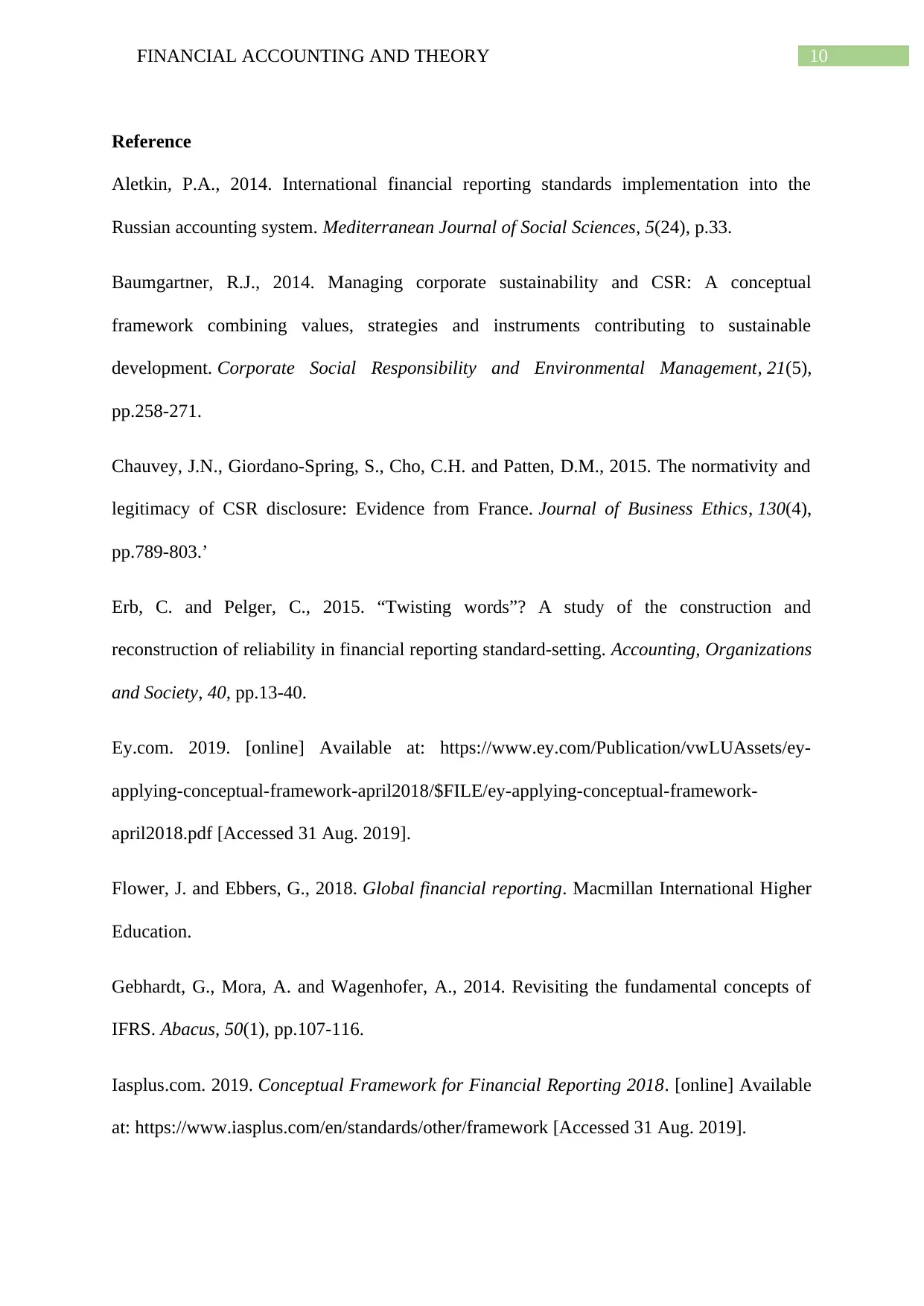
10FINANCIAL ACCOUNTING AND THEORY
Reference
Aletkin, P.A., 2014. International financial reporting standards implementation into the
Russian accounting system. Mediterranean Journal of Social Sciences, 5(24), p.33.
Baumgartner, R.J., 2014. Managing corporate sustainability and CSR: A conceptual
framework combining values, strategies and instruments contributing to sustainable
development. Corporate Social Responsibility and Environmental Management, 21(5),
pp.258-271.
Chauvey, J.N., Giordano-Spring, S., Cho, C.H. and Patten, D.M., 2015. The normativity and
legitimacy of CSR disclosure: Evidence from France. Journal of Business Ethics, 130(4),
pp.789-803.’
Erb, C. and Pelger, C., 2015. “Twisting words”? A study of the construction and
reconstruction of reliability in financial reporting standard-setting. Accounting, Organizations
and Society, 40, pp.13-40.
Ey.com. 2019. [online] Available at: https://www.ey.com/Publication/vwLUAssets/ey-
applying-conceptual-framework-april2018/$FILE/ey-applying-conceptual-framework-
april2018.pdf [Accessed 31 Aug. 2019].
Flower, J. and Ebbers, G., 2018. Global financial reporting. Macmillan International Higher
Education.
Gebhardt, G., Mora, A. and Wagenhofer, A., 2014. Revisiting the fundamental concepts of
IFRS. Abacus, 50(1), pp.107-116.
Iasplus.com. 2019. Conceptual Framework for Financial Reporting 2018. [online] Available
at: https://www.iasplus.com/en/standards/other/framework [Accessed 31 Aug. 2019].
Reference
Aletkin, P.A., 2014. International financial reporting standards implementation into the
Russian accounting system. Mediterranean Journal of Social Sciences, 5(24), p.33.
Baumgartner, R.J., 2014. Managing corporate sustainability and CSR: A conceptual
framework combining values, strategies and instruments contributing to sustainable
development. Corporate Social Responsibility and Environmental Management, 21(5),
pp.258-271.
Chauvey, J.N., Giordano-Spring, S., Cho, C.H. and Patten, D.M., 2015. The normativity and
legitimacy of CSR disclosure: Evidence from France. Journal of Business Ethics, 130(4),
pp.789-803.’
Erb, C. and Pelger, C., 2015. “Twisting words”? A study of the construction and
reconstruction of reliability in financial reporting standard-setting. Accounting, Organizations
and Society, 40, pp.13-40.
Ey.com. 2019. [online] Available at: https://www.ey.com/Publication/vwLUAssets/ey-
applying-conceptual-framework-april2018/$FILE/ey-applying-conceptual-framework-
april2018.pdf [Accessed 31 Aug. 2019].
Flower, J. and Ebbers, G., 2018. Global financial reporting. Macmillan International Higher
Education.
Gebhardt, G., Mora, A. and Wagenhofer, A., 2014. Revisiting the fundamental concepts of
IFRS. Abacus, 50(1), pp.107-116.
Iasplus.com. 2019. Conceptual Framework for Financial Reporting 2018. [online] Available
at: https://www.iasplus.com/en/standards/other/framework [Accessed 31 Aug. 2019].
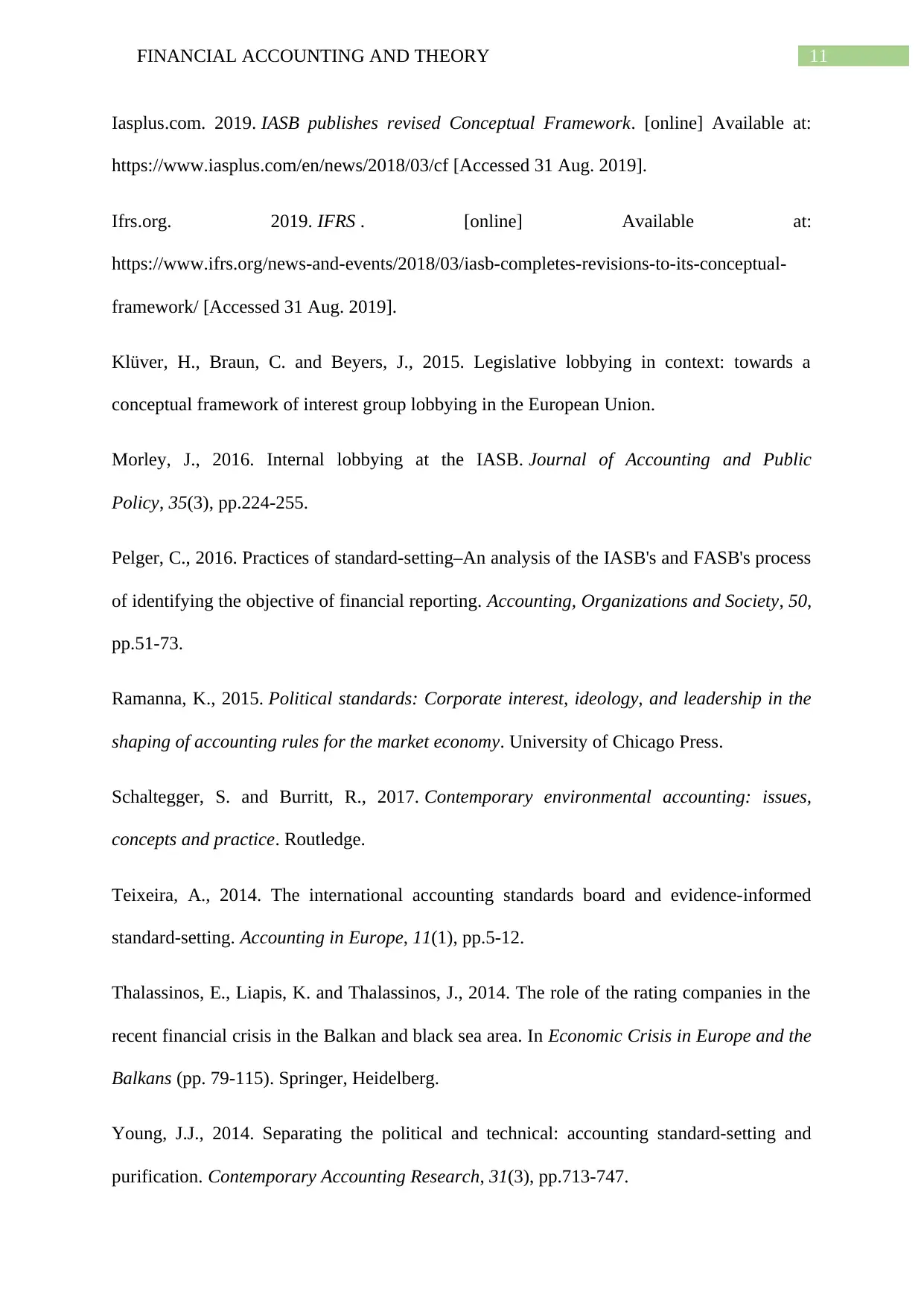
11FINANCIAL ACCOUNTING AND THEORY
Iasplus.com. 2019. IASB publishes revised Conceptual Framework. [online] Available at:
https://www.iasplus.com/en/news/2018/03/cf [Accessed 31 Aug. 2019].
Ifrs.org. 2019. IFRS . [online] Available at:
https://www.ifrs.org/news-and-events/2018/03/iasb-completes-revisions-to-its-conceptual-
framework/ [Accessed 31 Aug. 2019].
Klüver, H., Braun, C. and Beyers, J., 2015. Legislative lobbying in context: towards a
conceptual framework of interest group lobbying in the European Union.
Morley, J., 2016. Internal lobbying at the IASB. Journal of Accounting and Public
Policy, 35(3), pp.224-255.
Pelger, C., 2016. Practices of standard-setting–An analysis of the IASB's and FASB's process
of identifying the objective of financial reporting. Accounting, Organizations and Society, 50,
pp.51-73.
Ramanna, K., 2015. Political standards: Corporate interest, ideology, and leadership in the
shaping of accounting rules for the market economy. University of Chicago Press.
Schaltegger, S. and Burritt, R., 2017. Contemporary environmental accounting: issues,
concepts and practice. Routledge.
Teixeira, A., 2014. The international accounting standards board and evidence-informed
standard-setting. Accounting in Europe, 11(1), pp.5-12.
Thalassinos, E., Liapis, K. and Thalassinos, J., 2014. The role of the rating companies in the
recent financial crisis in the Balkan and black sea area. In Economic Crisis in Europe and the
Balkans (pp. 79-115). Springer, Heidelberg.
Young, J.J., 2014. Separating the political and technical: accounting standard‐setting and
purification. Contemporary Accounting Research, 31(3), pp.713-747.
Iasplus.com. 2019. IASB publishes revised Conceptual Framework. [online] Available at:
https://www.iasplus.com/en/news/2018/03/cf [Accessed 31 Aug. 2019].
Ifrs.org. 2019. IFRS . [online] Available at:
https://www.ifrs.org/news-and-events/2018/03/iasb-completes-revisions-to-its-conceptual-
framework/ [Accessed 31 Aug. 2019].
Klüver, H., Braun, C. and Beyers, J., 2015. Legislative lobbying in context: towards a
conceptual framework of interest group lobbying in the European Union.
Morley, J., 2016. Internal lobbying at the IASB. Journal of Accounting and Public
Policy, 35(3), pp.224-255.
Pelger, C., 2016. Practices of standard-setting–An analysis of the IASB's and FASB's process
of identifying the objective of financial reporting. Accounting, Organizations and Society, 50,
pp.51-73.
Ramanna, K., 2015. Political standards: Corporate interest, ideology, and leadership in the
shaping of accounting rules for the market economy. University of Chicago Press.
Schaltegger, S. and Burritt, R., 2017. Contemporary environmental accounting: issues,
concepts and practice. Routledge.
Teixeira, A., 2014. The international accounting standards board and evidence-informed
standard-setting. Accounting in Europe, 11(1), pp.5-12.
Thalassinos, E., Liapis, K. and Thalassinos, J., 2014. The role of the rating companies in the
recent financial crisis in the Balkan and black sea area. In Economic Crisis in Europe and the
Balkans (pp. 79-115). Springer, Heidelberg.
Young, J.J., 2014. Separating the political and technical: accounting standard‐setting and
purification. Contemporary Accounting Research, 31(3), pp.713-747.
⊘ This is a preview!⊘
Do you want full access?
Subscribe today to unlock all pages.

Trusted by 1+ million students worldwide
1 out of 13
Related Documents
Your All-in-One AI-Powered Toolkit for Academic Success.
+13062052269
info@desklib.com
Available 24*7 on WhatsApp / Email
![[object Object]](/_next/static/media/star-bottom.7253800d.svg)
Unlock your academic potential
Copyright © 2020–2025 A2Z Services. All Rights Reserved. Developed and managed by ZUCOL.





